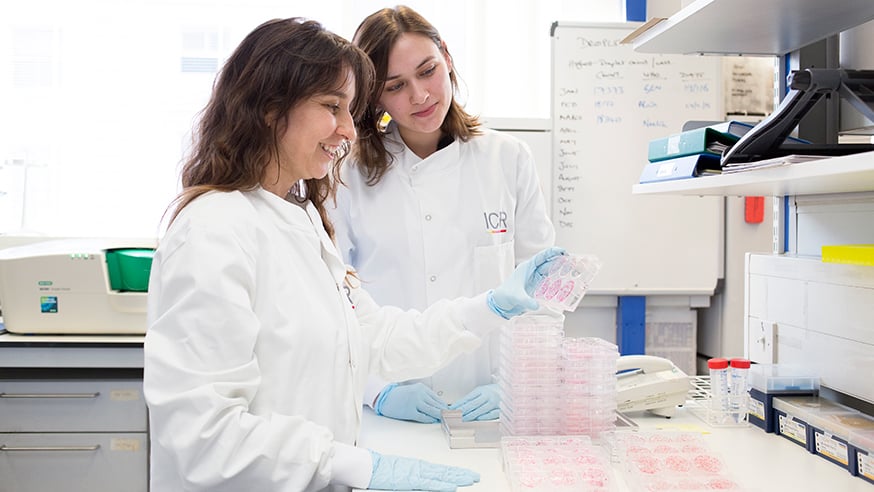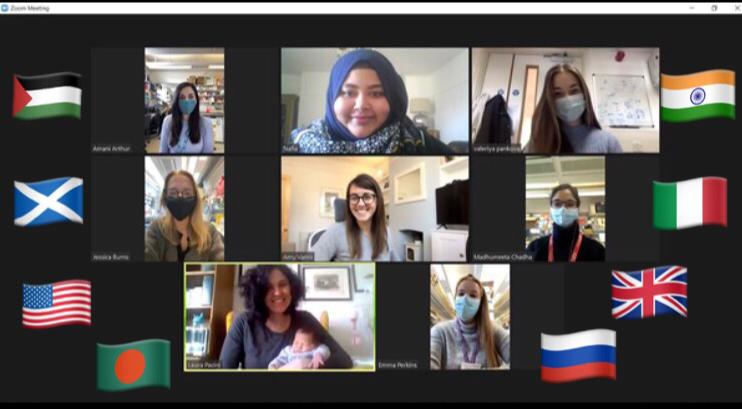
What do you picture when you think of mentorship in science? For many people, it’s a leading senior scientist who sees themself in a young researcher and takes them under their wing as a protégé. While this can happen, it’s not always the case or the ideal because it tends to exclude women and ethnic minorities. Mentorship comes in all sorts of shapes and sizes — one person can have many mentors throughout their career, they can be formal or informal ones, and opportunities can come up in unexpected ways. Mentorship can have a huge impact on scientists’ careers, lives and research. Despite the widespread benefits of mentoring, not everyone has access to a mentor, and the route to finding one, developing that relationship, and becoming a good mentor, is not always straightforward.
Breaking down barriers
To help break down the barriers to mentorship, the ICR has established several formal mentoring programmes aimed at supporting different staff groups.
Dr Vanessa McKean, Equity, Diversity and Inclusion Manager at the ICR, said: “Formal programmes make the opportunities to benefit from mentoring relationships more equitable, and it means that people who are less likely to go and seek out a mentor by themselves have that opportunity.”
For example, when the ICR and Royal Marsden BRC clinical academic careers mentorship programme was established in 2016, it was dedicated to women in the first year because a survey of clinicians found that women were less likely than men to have mentors and therefore less likely to benefit from them. Data also showed female clinicians were less likely to go on to postdoctoral research after completing a PhD, and more likely to find it difficult to remain research-active on return to the NHS. Our work with the Royal Marsden Cancer BRC – including our mentoring schemes – has supported more women staying at the ICR in postdoctoral clinical academic roles.
The ICR now also has mentoring programmes for Scientific Officers, Postdocs and for the Career Development Faculty and ICR Fellows. The programmes aim to equip researchers for the transition points in their careers; these junctures also represent the most significant barriers to career progression for women.
A critical friend, a supporter, a buddy
Mentorship is a nuanced process and no two mentorship journeys are the same. We spoke to Professor Judith Bliss, Director of the CRUK-funded ICR Clinical Trials & Statistics Unit, and Holly Tovey, a Senior Statistician with the ICR Clinical Trials & Statistics Unit and part-time PhD student at the ICR, about their experiences.
For Professor Bliss, a mentor is a ‘critical friend’. She said: “A mentor is somebody who you have real trust and respect for. But actually, who is equally prepared to gently and supportively point out your shortcomings as well as the areas in which you know you're thriving and surviving. And to be a listening ear obviously is crucial.”
For Holly, different mentors helped her at different points in her career. One of the first people she considered a mentor was a supervisor during a placement. The mentor kept in touch and helped Holly as she applied to MSc courses, and when she began to look for jobs, her mentor pushed her to apply for roles that weren’t just entry level.
When Holly joined the ICR, she was paired with a ‘buddy’ who she said also became a mentor: “So someone I could go to if I had any questions or if I wanted support with specific things but maybe in a less formal situation than discussing with my line manager … because they were a few years ahead of me, they were more recent in the experience and could talk about questions that come up in interviews or things like that as well.”
Hear more from our researchers about #MemorableMentors on Twitter.
Women in Science
Women in science face unique challenges. One is the lack of women in leadership positions, particularly in certain fields. Our Women in Science group brings together female faculty and senior researchers from the ICR, the Royal Marsden and the Francis Crick Institute on a monthly basis.
Professor Bliss recalls formal mentoring programmes didn’t exist in the same way when she was beginning her career, so she had to forge her own path and seek out mentors.
She said: “I think there can be a lot of benefit from having mentorship across women who've experienced similar challenges, and perhaps in similar roles. That might be outside your own organisation, but just to help navigating and managing some of those career changes.
“People have different needs at different times in their careers and there might be family dimensions that women do tend to face more than men … and I think people who really understand those needs can actually be very supportive mentors to help you make those transitions in your career.”
Mentorship during Covid

Happy International Day of Women and Girls in Science!
Celebrating the amazing women in our lab, who inspire us through sharing their knowledge and expertise. Even a pandemic can't stop us from lifting each other up!
Also, spot our newest, cutest scientist! #MemorableMentors pic.twitter.com/5vtEf2lVUE
— Huang Lab ICR (@HuangLabICR) February 11, 2021
Mentorship looks different during the Covid pandemic. Instead of building relationships at conferences or networking events, it might be more difficult to know who to approach for independent mentoring. Within a team, mentoring sessions could take the form of a Zoom coffee or phone call to check in on a mentee rather than a catch up in the lab. While so many of us aren't able to work with our colleagues as normal, having someone there to offer help and support is more important than ever before.
Our mentoring programmes have adapted by going online and ensuring those spaces and networks are supported. More broadly, our women in science initiatives shifted quickly to help women and other groups who are disproportionately impacted by the Covid pandemic. We have introduced flexible and furlough working options across the ICR for those with caring responsibilities and support for childcare so staff can attend virtual conferences. The ICR also developed wellbeing activities and sessions for parents and carers.
Going forward, the goal is to shift from addressing short-term issues to understanding the potential longer-term impact of the Covid pandemic on women in science.
Dr McKean said: “The ICR is looking at what can we do now to address some of these issues which are not going to go away. We know that this will impact on our researchers for a long time to come”